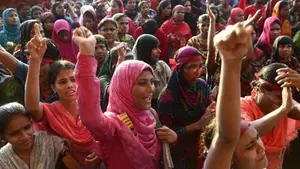Unrest Erupts: Bangladeshi Garment Workers Rally for Fair Wages, Clashes Result in Casualties
The news highlights the uproar as thousands of garment workers in Bangladesh rally for a significant increase in wages, escalating into clashes with security forces. The protests stem from the dire conditions faced by millions of workers in an industry that contributes significantly to the country's exports, with demands for fairer compensation amplifying tensions, resulting in casualties and property damage.
Bangladesh Garment Workers Protest for Wage Hikes, Violence Claims One Life.

In Bangladesh, a massive outcry reverberated as thousands of garment workers took to the streets on Monday, demanding a substantial three-fold increase in minimum wages. The protests, aimed at addressing the dire conditions faced by the country's four million apparel workers, turned tumultuous, resulting in clashes with security forces, leading to one casualty, as confirmed by the police.
The nation, recognized as one of the globe’s primary garment exporters, heavily relies on this industry, contributing to 85 percent of its annual $55 billion exports. The grievances of the workers, however, stem from the meager conditions despite the industry's massive economic contribution.
The protests were widespread, spanning key industrial zones. In Gazipur, the largest industrial city, approximately 10,000 workers abandoned their shifts to demonstrate, while another 7,000 gathered in Ashulia and Hemayetpur. Discrepancies arose regarding the exact numbers, with a union leader contesting the police figures, claiming a significantly higher count of over 100,000 protesters in Ashulia.
The situation turned violent, especially on a highway leading from the capital, Dhaka, to Mymensingh, where around 4,000 workers clashed with police, resulting in road blockades and the torching of a pick-up truck. Regrettably, one worker succumbed to injuries sustained during these clashes, amplifying the gravity of the protests.
Police efforts to contain the situation involved deploying tear gas and sound grenades to disperse the demonstrators, who reportedly damaged around 40 factories, smashing windows and destroying furniture in their wake.
The root cause of these demonstrations lies in the stark wage disparities. The garment workers, responsible for manufacturing clothing for numerous global retail giants, receive a meager basic monthly wage of just 8,300 taka ($75). The protests escalated following the manufacturers' association offering a mere 25 percent wage increase, failing to meet the demands put forth by unions for a new monthly minimum basic wage of 23,000 taka ($208).
Authorities are now engaged in dialogues with union leaders, seeking a peaceful resolution to the escalating tensions and addressing the workers' fundamental demands.



